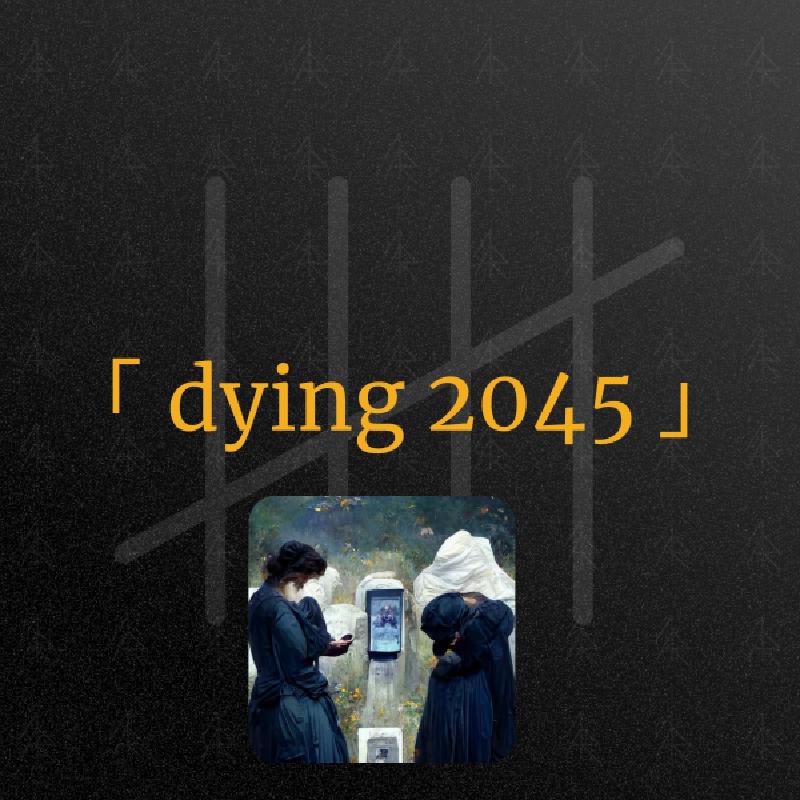what
“Dying in 2045” (original German: “Wie werden wir in Zukunft sterben?”) offers an insightful outlook into a future where technology and society have evolved together, profoundly affecting how we live and eventually die. The book explores the deep integration of digitalization in our daily lives, touching on its historical roots and potential trajectory towards 2045.
From book’s official description:
How will we treat dying, death and mourning individually, socially and institutionally in 2045, how will needs and expectations develop? Will the trend towards individualization, isolation and dying in care facilities continue? What impact will digitalization have? Experts from various fields of action and scientific disciplines develop scenarios for how dying, death and mourning will be organized in the future. They open up “desirable” perspectives and show what needs to be done to make them a reality.
Chapter I was honored to work on: “Digitalization, Scenarios of a digitalized society”. It delves into the concept of true digitalization, distinguishing it from mere digital mimicry and underscoring its transformative impact across various domains, including healthcare, consumer trends, and end-of-life experiences.
my chapter
Larionov, P. (2023). Szenarien einer digitalisierten Gesellschaft. In Psychosozial-Verlag eBooks (pp. 297–312). https://doi.org/10.30820/9783837961058-297
The book is in German, so I’ve decided to publish a raw, unedited by co-authors english version here on my website.
chapter’s overview
- Introduction: Sets the stage by reflecting on digitalization’s historical roots and its profound influence on society. This chapter contemplates the profound changes digitalization has brought, starting from Morse code to AI-driven technologies.
- Currently Existing Trends in Technology and Digitalization: Examines current technological trends and their implications. Focuses on the status quo of technology, particularly in healthcare and consumer products.
- True Digitalization: Differentiates between superficial digital mimicry and genuine, transformative digitalization. Explores the evolution of digitalization from initial replication of physical entities to fully realized digital integration.
- Consumer Trends: Discusses current trends in consumer technology, particularly health tracking and digital healthcare apps. Analyzes current consumer technologies like health tracking wearables and digital healthcare apps, highlighting their benefits and shortcomings.
- Upcoming Trends: Predicts future developments in IT corporations, digital healthcare, AI in mental health, the metaverse, and blockchain in healthcare. Looks at future prospects, including IT giants entering healthcare, AI in mental health, metaverse development, and blockchain’s potential in healthcare.
- End of Life: Explores how digital advancements might alter perceptions and experiences of death. Speculates on how technology might transform our experience of death, including digital avatars and virtual reality.
full book
Wie werden wir in Zukunft sterben? (2023). In Psychosozial-Verlag eBooks. https://doi.org/10.30820/9783837961058
You can buy your copy directly on Psychosozial-Verlag website.
my role
- One of the researchers and authors.
- Created web presence for the project: https://sterben-tod-trauer-2045.de/
- Created the artwork for the book cover and for the project’s webpage.
where / with whom
I was invited to work on the chapter by Prof. Dr. Wolfgang George. Full list of authors (29 in total):
Tatjana Ahle-Rosental, Thorsten Benkel, Eckhard Dommer, Annette Franke, Wolfgang George, Paul Herrlein, Johannes Herrmann, Ulrike Kempchen, Johanna Klug, David Kröll, Pavel Larionov, Eberhard Lux, Barbara Meyer-Zehnder, Elmar Nass, Jens Papke, Hans Pargger, Dirk Pörschmann, Lena Reseck, Karl-Christian Schelzke, Heike Seeliger, Thomas Sitte, Elke Steudter, Elisabeth Vanderheiden, Karsten Weber, Conrad Wesch, Christoph Wiese und Volker Ziegler
when
Written in May-October 2022, printed and published in September 2023.
so what?
“Dying in 2045” paints a vivid picture of a future where digital technology is deeply woven into our social fabric. It predicts significant transformations in healthcare, consumer behavior, and even our understanding of life and death. The book encourages readers to consider how these advancements might shape not just technology but our very humanity.
In my chapter, I predicted (the book was published in 2023, but all the drafts were ready more than year ago - editing and finalization takes time) the emergence of the next-level chatbots and their application as therapists.
